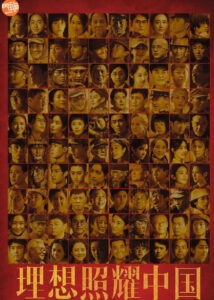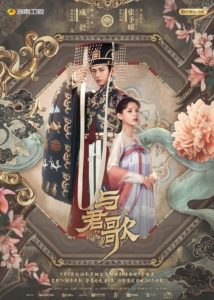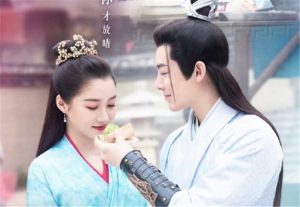The Lost Tomb 2 : Explore with the Note Episode 16 Recap
> The Lost Tomb 2 : Explore with the Note Recap
Li Boss recounted an ancestral tale, explaining that his ancestor, at six years old during the chaotic Northern Wei period, was given a mysterious cloth by a dying soldier after offering him water. The ancestor, being illiterate, didn't understand its contents until much later. After joining the military, he gradually rose to the rank of officer and learned about a major battle near his childhood home.
It was a chase initiated by the Grand Marshal to eliminate a young prince, who was protected by an extraordinary force known as the Mute Riders. Li Boss clarified that the Mute Riders were a troop composed entirely of mute individuals, from general to soldier, ensuring no secrets could be divulged. Their duty involved raiding ancient tombs; they would first record the locations and seal them, returning to excavate the artifacts only when needed.
He then revealed that the cloth his ancestor possessed was, in fact, the legendary Tombs Collection, which contained the locations of these very tombs. The others questioned if his family had become incredibly wealthy from this discovery. Li Boss explained that his ancestor couldn't read the cloth, and his family fortunes declined, so he was buried with little more than worn clothes. However, during his great-grandfather's time, who was a wealthy landlord, they decided to move the family tomb.
In the process, they found the cloth perfectly preserved amidst other decaying items. Unable to decipher it himself, his great-grandfather consulted an antique merchant who identified the writing as a form of Braille understood only by mutes, and confirmed its identity as the Tombs Collection. Li Boss further elaborated that some locations on the map had been raided, marked with ink, while others remained untouched.
He implied that the treasures from these tombs were being used to recruit soldiers to fight against the Grand Marshal. He added that the cloth, though incomplete, listed 24 tombs, and they were now heading to the last one, which was expected to be the richest. He cautioned that while the treasures would be more than enough for ordinary people and of the highest quality, they also came with grave dangers, so vigilance was paramount.
During this discussion, Wu Xie and Wang Pangzi, who were hiding nearby and eavesdropping, accidentally made a noise. Uncle Tai, alerted, ordered his men to investigate. Wu Xie, thinking quickly, created an illusion of an approaching mountain patrol, causing Uncle Tai's group to flee in a panic. Wu Xie then suggested to Wang Pangzi that pursuing them in the dark was unwise and they should rest, following their footsteps the next morning since the others would also need to stop.
The following day, Wu Xie and Wang Pangzi continued their journey but soon found themselves lost. They encountered a woman, Da Shan's wife, who sternly reprimanded them, accusing them of being either tomb raiders or hunters. Wang Pangzi tried to mollify her with money, which her husband, Da Shan, readily accepted. Da Shan offered them directions but also suggested they stay with him overnight since it was getting late, and they might get lost in the mountains.
He promised to guide them the next day after he finished gathering pig feed. Wu Xie, concerned about their dwindling food supplies, agreed, believing that following Da Shan would also provide more information about the area. Da Shan led them to a shack, explaining it was a communal lodging built by villagers for those who couldn't return home from the mountains, complete with emergency rations. Da Shan's wife urged everyone to get an early rest.
Later that night, as Wu Xie and Wang Pangzi slept, Da Shan quietly rose, picked up a sickle, and walked out of the room seemingly in a trance. Sensing something amiss, Wu Xie and Wang Pangzi followed him into the forest. Wu Xie's leg was suddenly grabbed from a hole. Wang Pangzi prepared to use his knife, but Wu Xie realized it was a person, not a corpse, and told him to stop.
Da Shan then reappeared, roused from his daze, and scolded them for wandering at night. Wu Xie pressed him about who was in the hole. Da Shan reluctantly confessed that it was his mentally ill son, locked inside. Wu Xie angrily criticized Da Shan's cruelty, insisting that his son needed medical treatment, not imprisonment. A distressed Da Shan explained that his son and his cousin had, against warnings, ventured deep into the forbidden parts of the mountains.
After more than ten days, they returned with a "bronze twig," claiming to have found a huge pit containing a massive bronze tree that promised longevity. They became obsessed with the twig, constantly staring at it. Da Shan noticed a disturbing change in their demeanor. One day, his son attacked and killed his cousin, insisting that the real cousin had died in the pit and the one who returned was a fake.
He even began to believe that Da Shan and his wife were fakes, claiming they had been killed by a wolf. His son became violent, once biting his wife's neck so severely that she nearly bled to death. Fearing for the safety of the other villagers, Da Shan had no choice but to lock his son in the cave, occasionally bringing him food.
The bronze twig, too, was buried inside the hole, as his son would go into uncontrollable fits if it was taken away. Wang Pangzi attempted to buy the bronze twig, but Da Shan refused, warning it was cursed and brought misfortune. Wu Xie, though believing Da Shan's story, found it hard to believe a mere bronze object could induce such madness. Wang Pangzi, however, speculated that it was greed that drove the son to kill his cousin for the treasure.
Despite the grim circumstances, Wu Xie felt immense pity for the son and expressed a desire to take him to an asylum in the city at his own expense. Wang Pangzi questioned his ability to help everyone, but Wu Xie felt compelled to act given what he knew. As they walked back, Wu Xie stumbled and saw what appeared to be Da Shan's blood-soaked clothes. But then, a perfectly unharmed Da Shan appeared behind them, terrifying them.
Later, Wang Pangzi assured Wu Xie that Da Shan seemed normal. Wu Xie, rationalizing the bizarre events, concluded that the strange phenomena were likely hallucinations caused by miasma—low oxygen levels and gases produced by respiring plants and decomposing organic matter in the dense, late-night jungle. The next morning, Da Shan, needing to address an urgent village matter, was unable to guide them. Instead, he introduced them to Mr. Liu.
Mr. Liu, upon learning their destination, immediately warned them against going to Jiazi Falls, claiming the mountain was in an "evil period," teeming with ghosts and intense "ghost fire" at night. Wu Xie tried to explain "ghost fire" as mere phosphorescence, but Mr. Liu dismissed scientific explanations, fearful of angering a "King of Ghosts." Mr. Liu then recounted an old village legend about a "spooky army" during the Northern Wei dynasty, whose members never spoke.
Since then, the sounds of galloping horses were often heard in the area, leading to Jiazi Falls, their destination. Wu Xie inquired about Da Shan's son, asking if his madness was linked to finding a bronze twig. Mr. Liu confirmed that Da Shan's son was not an isolated case. He explained that many villagers who ventured into the mountain had found bronze objects, ceramic shards, or jade pieces.
However, only those who found bronze objects and did not promptly discard them would go mad within days, often resorting to killing others or themselves. Mr. Liu further clarified that Da Shan couldn't dispose of the bronze twig because his son would become uncontrollable whenever it was taken away. To prevent the twig from harming others, Da Shan eventually moved out of the village with his son and the object.
Mr. Liu, however, declined to guide them due to his age and the dangers of the mountain, providing them with general directions instead. Continuing their journey towards the cliffs, Wu Xie pondered the connection between the Northern Wei dynasty and the mute army, convinced it was related to the Tombs Collection. As they prepared to move on, Wu Xie discovered his bag was missing.
Wang Pangzi immediately suspected monkeys and urged them to continue, assuring Wu Xie that his own equipment was sufficient for entering the tomb. Wu Xie reluctantly agreed, worried about the bronze bell inside his bag. Unbeknownst to them, their movements were being closely monitored. They soon arrived at a mysterious location and discovered eerie human head effigies. Wang Pangzi was perplexed by the skulls on the rocks, but Wu Xie explained that these were "Terracotta Sacrifices" from ancient warfare.
He elaborated that in those times, military success was measured by the number of enemies killed, and since transporting entire bodies was too cumbersome, heads were often taken. These heads, specifically, were mounted on terracotta effigies as part of a ritual where live war captives were sacrificed.




















